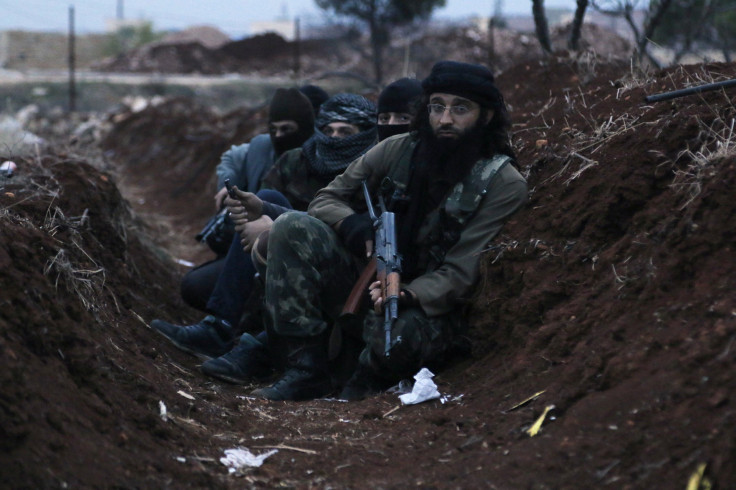Jabhat al-Nusra's Gains In Idlib Pave The Way For An Al Qaeda Islamic Emirate In Syria

The Islamic State group declared its caliphate in Syria in June, but it isn’t the only group trying to claim a piece of the war-torn country. Though Syrian Kurdish factions are fighting to keep Kobani and the surrounding area and the regime owns the skies, al Qaeda affiliate Jabhat al-Nusra’s recent advances have put it in the running for an Islamic emirate in Syria. The goal, according to analysts, is attainable.
The group, whose name translates literally as "front of support," has been active in Syria since the early months of the war, but its recent momentum threatens the U.S. strategy to arm "moderate" rebels in Syria. In a rare speech last month, Nusra leader Abu Mohammed al-Joulani said his group wanted to obliterate the moderate Syrian Revolutionary Front (SRF) “since they are dealing with Saudi Arabia and the USA.” Eliminating rebel groups is the first step toward an al Qaeda emirate and puts the U.S. at risk of eventually fighting two militant Islamist empires. Al Qaeda's tactics of gaining support through anti-Syrian regime rhetoric and a widespread and cohesive network of allied rebel groups has made its emirate dream possible, experts said.
“JN’s [Nusra] methodology is patient and is targeted toward the transformation of Syrian society itself as a prerequisite for the establishment of an emirate,” Jennifer Cafarella, a Syria analyst at the Institute for the Study of War (ISW), said in an email. “JN [Nusra] is engaged in a very long-term campaign, and currently remains in a nuanced and sophisticated conditions-setting stage in which it is leveraging a role as a counter-[Syrian President Bashar] Assad force to slowly cultivate the buy-in of the local population and local leaders."
The battle for Syria’s land has split areas of control straight down the map. In the East, ISIS seized the vast majority of territory from Raqqa to Deir al-Zour. But in the West, on the border with Lebanon, Israel and Jordan, there is a trend of non-ISIS jihadist groups forming their own state projects where brigades are quick to switch allegiance or even consolidate forces to seize larger territory. Nusra militants, rebel groups of varying moderateness and regime forces are all “fighting for what’s left in Syria,” said Aymenn Jawad al-Tamimi, a professor at Israel's Hertzliya University and a Shillman-Ginsburg fellow at the Middle East Forum.
Since October, Nusra has made significant gains and was able to secure a foothold in Idlib province after clashes with U.S.-backed moderate opposition groups affiliated with the Free Syrian Army (FSA). This week, it launched two offensives toward regime-controlled towns north of Aleppo, trying to secure a supply route and establish a base to attack Kurdish-controlled areas to the north, according to ISW. Last week, Nusra militants seized seven towns south of Aleppo.
Nusra’s advances were possible in part because of growing support from civilians on the ground. Many say the al Qaeda affiliate is the only faction able, and willing, to fight the Syrian regime. Activists in the province said civilians even took up arms in solidarity with Nusra against the SRF, according to the ISW.
Certain rebel groups based in the Idlib and Aleppo areas also supported Nusra’s advances, further tangling an already complex knot of allegiances in the province. Near Aleppo, Nusra reportedly fought with Jaish al-Islam, one of the main battalions under the Islamic Front rebel group umbrella, that prides itself on being separate from both extremist and “moderate” groups.
“It is actually JN's network of rebel relationships that is the key factor in enabling its establishment of an Islamic Emirate in Syria as a stepping stone in the global AQ pursuit of a caliphate,” Cafarella said.
As Nusra gained rebel support, the FSA regrouped and formed at least two regional alliances this month: The Union of Southern Idlib Revolutionaries and the al-Sohl Force. Among the brigades included were Ahrar al-Sham, Jaish al-Islam, and Suqoor al-Sham. However, at least two branches from each fought with Nusra when militants removed SRF and FSA forces from southern Idlib, calling into question their credibility as “moderate” groups, according to ISW.
It's unlikely the Nusra Front will declare an emirate before ousting the regime, but for now, it is "a threat to western interests in its own right,” Cafarella said.
© Copyright IBTimes 2024. All rights reserved.






















